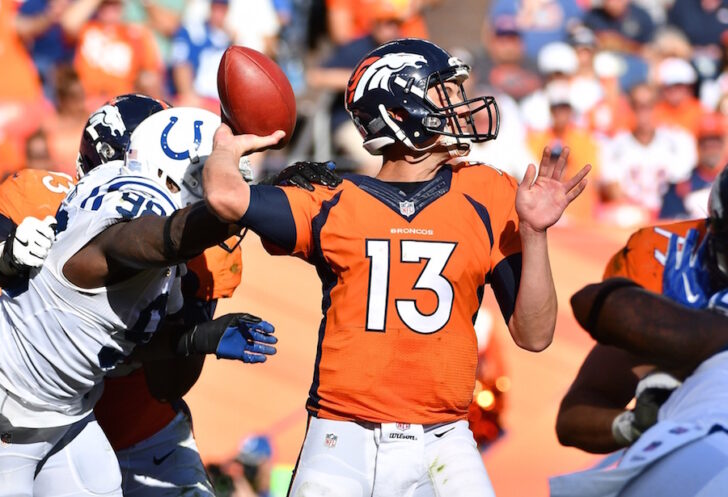Winning masks a lot of problems. Look no further than the Mile High City for a prime example.
In Week 1 of the NFL season, the Broncos escaped with a 21-20 victory over the Panthers in a rematch of Super Bowl 50; the win seemed to suggest that Denver was once again an upper-echelon team. But if Graham Gano’s game-winning field goal attempt had drifted a few feet to the right, people would have been singing a different tune last week; there would’ve been a lot more focus on the scoring opportunities that were squandered by the defending champion’s new quarterback.
The same thing can be said for yesterday. Yes, the Broncos moved to 2-0 with a 34-20 win over the Colts. But if Denver’s defense hadn’t put more touchdowns on the board than their offense, there would be a lot more emphasis on the fact that drive after drive after drive seems to end in three points instead of seven for Gary Kubiak’s crew.
Mistakes, blunders and flaws tend to get downplayed when a team winds up ahead on the scoreboard at the end of the game. That’s certainly the case in Denver right now. And that’s a dangerous proposition.
Optimists will point out that the Broncos are 2-0. They’ll suggest that Trevor Siemian is developing as the team’s new quarterback. And they’ll contend that Denver’s defense is as good as it was a year ago, when it carried the orange and blue to the third world championship in franchise history.
All of those things are true, or at least somewhat accurate. But they also fail to tell the entire story of the season thus far.
Through two games, the Broncos offense is averaging just 20 points; they put 21 on the board against Carolina and managed just 19 yesterday against Indianapolis. That’s a pretty anemic output, especially considering the fact that the Colts were playing defensive backs who were working retail jobs just two weeks ago.
In part, this lack of production is by design; after all, Kubiak’s dink-and-dunk offense put those kinds of numbers on the scoreboard a year ago with Peyton Manning and Brock Osweiler at the helm. But it’s also due to the fact that Siemian hasn’t played very well; he’s thrown three interceptions thus far and has shown zero ability to stretch the field with long passes, two alarming trends that will eventually catch up to the Broncos as the season progresses.
During those same two weeks of the season, Denver’s defense is giving up an average of 20 points; they allowed exactly that number to both the Panthers and the Colts. That’s certainly a respectable showing, given that they’ve faced Cam Newton and Andrew Luck, respectively. But it’s also a sign that the opposition is going to put points on the board; pitching shutouts doesn’t happen in the NFL, no matter how good a defense a team fields.
If this pattern continues, with Denver averaging 20 points per game on offense and also surrendering that exact same number on defense, it’s going to be a long year for the Broncos. Those kind of dead-even scoring statistics tend to lead to 8-8 seasons. One look at the NFL’s final 2015 standings makes this point; that’s the result seen in places like Atlanta, Buffalo and Washington; a nearly even scoring differential had those teams hovering around .500 all year long.
That might suffice for the Bills, Falcons and Redskins, but it doesn’t fly in a town that has championship aspirations on an annual basis. Anything short of competing for the AFC West title, making a playoff run and flirting with a trip to the Super Bowl is seen as a failure in the Mile High City.
And if the Broncos don’t get their offense fixed in a hurry, that’s exactly the category that the 2016 season is going to be heading toward. Right now, things are adding up to a run at 8-8.
But things can be corrected. There’s still plenty of time to right the ship.
First and foremost, Denver has the defense to stay in every single game. Of course, that’s dependent on them staying relatively healthy, something that was shown to be a tenuous situation yesterday when DeMarcus Ware suffered a fractured ulna bone.
They also have the tools on offense to show improvement. On the outside, the duo of Demaryius Thomas and Emmanuel Sanders is as good as any in the business. In the backfield, C.J. Anderson is running as well as anybody in the NFL. And up front, the Broncos offensive line appears to be vastly improved over the hodgepodge group they fielded last season.
But in order to take a significant step forward, they have to get far better play at the quarterback position. People can grade Siemian on a curve if they’d like, giving him a free pass because he’s only made two starts in his young career, but that’s not a recipe for long-term success. Opposing teams aren’t going to cut him any breaks; the Broncos can’t either.
For starters, Siemian has to take better care of the football. Game managers, of which he is clearly one, can’t throw three interceptions in two weeks, especially when the picks takes points off of the scoreboard. In addition, he has to start stretching the field; if Jim Nantz and Phil Simms keeping showing stats about how far downfield the Broncos quarterback is throwing passes, it’s going to be a long season.
If Siemian can’t do those two things, starting next Sunday in Cincinnati, the clock needs to start ticking on his tenure as the starter. Three weeks of subpar play at the quarterback position should get people clamoring for Paxton Lynch to get his chance behind center.
The Broncos knew they could survive the first two weeks of the season by playing conservative football; playing at home gave them that luxury. But the honeymoon is about to be over; their current level of offensive production isn’t going to suffice on the road against the Bengals.
An undefeated start to the season is nice, but it doesn’t hide Denver’s problems. It’s time to get them fixed or to start looking for another option.



